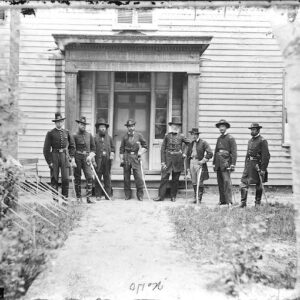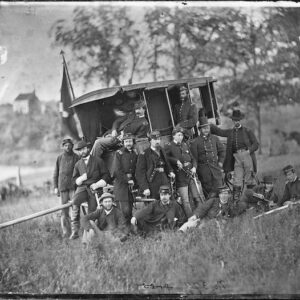Tag: Kip (Lawrence)
 Wikipedia says: Lawrence Kip (September 17, 1836 – November 17, 1899) was an American soldier, author, and sportsman who was prominent in New York society during the Gilded Age.
Wikipedia says: Lawrence Kip (September 17, 1836 – November 17, 1899) was an American soldier, author, and sportsman who was prominent in New York society during the Gilded Age.
Kip was born on September 17, 1836 in Morristown, New Jersey. He was the son of The Right Reverend William Ingraham Kip (1811–1893), and Maria Elizabeth (née Lawrence) Kip (1812–1893). His younger brother was William Ingraham Kip Jr., who married Elizabeth Clementine Kinney, the daughter of the U.S. Ambassador to Italy, William Burnet Kinney. Kip’s father was a prominent minister who served at Grace Church before becoming the Episcopal Bishop of California until his death in 1893.
His paternal grandparents were Leonard Kip and Maria (née Ingraham) Kip and his uncle was author Leonard Kip. He was descended from Hendrick Hendricksen Kip, one of the nine original assemblymen serving in New Amsterdam from 1647 under Pieter Stuyvesant, Governor of New Netherlands. His ancestors were the namesake of Kips Bay in Manhattan. His maternal grandparents were merchant banker Isaac Lawrence and Cornelia (née Beach) Lawrence, herself the daughter of a minister of Trinity Church.
Kip attended the Churchill Military Academy at Sing Sing, and was appointed Cadet at the United States Military Academy at West Point in June 1853.
Following his graduation from West Point, he was commissioned a Second lieutenant, Third Artillery in June 1857 and became part of the expedition under General Wright against the northern Indians. During this campaign, he reportedly distinguished himself in the Battle of Four Lakes and Spokane Plains and acted as Adjutant of the Artillery Battalion. In 1859, Kip published an account of the campaign in a book entitled Army Life on the Pacific.
In 1861, at the beginning of the U.S. Civil War, he was Adjutant of the Third Artillery. Shortly thereafter, he resigned to join the staff of General Edwin Vose Sumner’s as senior aide-de-camp, achieving the rank of Major. He was a part of the Army of the Potomac which saw action in the Battles of Yorktown, Williamsburg, Fair Oaks, Seven Pines, Savage’s Station, Glendale, Malvern Hill, Antietam, Fredericksburg (all of which took place in 1862), and Mine Run which lasted from November 1863 until December 1863.
From June 25 to July 1, 1862 during the Seven Days Battles, he was acting Adjutant General of General Sumner’s Corps. Following the battles, Sumner recommended him for brevet Captain and brevet Major to the War Department for gallantry, however, the Senate failed to act on any recommendations from General George B. McClellan’s campaign.
After the death of General Sumner in March 1863, Kip went to work on the staff of General John E. Wool and was assigned to the Headquarters of the Department of the East, as Assistant Inspector General of the Artillery. Six months later, he again joined the Army of the Potomac and was assigned to the staff of Brevet Major General Robert O. Tyler, as Inspector of the Artillery Reserve, taking part in the Battle of Rappahanock Station.
He was later appointed aide-de-camp on the staff of Major General Philip Sheridan where he fought in the Battles of Trevilian Station in 1864, where he was wounded, Cedar Creek, where he was slightly wounded again in 1864. On June 11, 1864, he was brevetted Captain “for gallant and meritorious service at the battle of Trevillian Station, Va.”
In 1865, he was part of the Battles of Dinwiddie Court House, Five Forks, High Bridge, Sailor’s Creek, Appomattox Station, and Appomattox Court House, where Confederate General Robert E. Lee surrendered. On March 31 1865, he was brevetted Major “for gallant and meritorious service in the Cavalry campaign from Winchester to Petersburg and at the battle of Dinwiddie Court House, Va.” and on April 1, 1865, he was brevetted Lieutenant Colonel “for gallant and meritorious service at the battle of Five Forks, Va.”
Kip resigned from the Military in 1867.
Showing all 2 results

